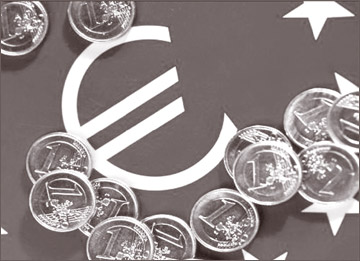Euro Zone - running out of options
Jagath C Savanadasa
The Euro-Zone crisis is subject to such rapid changes that a
definitive indication where the zone is heading cannot be predicted.
Late last month (May 27) stock markets in Asia were hopeful that
Greece, on the verge of economic collapse, will opt to stay within the
Euro Zone and not pull out of it. On the same day another view emanating
from European stock markets, observed that the stock markets in Europe
were fumbling in anticipation of an imminent Greek pull out.
 |
 |
 |
| Angela
Merkel |
Francois
Hollande |
David
Cameron |
Such conflict of views has gone on unabated till this day leading to
an air of total uncertainty and confusion. And unless plausible
solutions are forthcoming the situation will lead to further turmoil.
The big question is, could the world face another major financial
crisis?
From the perspective of Sri Lanka, the EU comprising 27 nations is an
important market. Though we have not been affected so far since our
exports are very small in terms of EU’s total imports, market volatility
does not auger well for us too.
The origins of the crisis and the path it has taken are so widely
known and so frequently featured in the international press, it does not
need recapitulation. Yet a brief look does not seem out of place.
European economies
A little over a year ago under the leadership of Germany, Europe’s
strongest economy and supported by France the second in Europe in terms
of economic strength, a fiscal pact was negotiated between 17 of the 27
EU nations. The idea was to revive the declining European economies
which were deeply into sovereign debt. The most debilitated of such
economies were Greece, Spain, Italy, Portugal and Ireland. Whilst
pumping billions of dollars through the European Central Bank to revive
the banks (and so as to strengthen the governments concerned), the pact
also incorporated controls on government spending and budgetary
discipline. In other words the Euro Zone was to embark on an austerity
drive, which it did.
But the sovereign debt crisis which certain nations faced did not
abate. On the contrary it worsened, plunging nations such as Greece into
a chaotic state.
Adding to the rising burden of the affected nations was the interest
paid by the governments of Spain, Greece and Italy to the banks. In
these nations recession was more severe and unemployment had reached
record levels.
This led to the swelling belief that it was austerity measures that
caused the situation. And across Europe austerity led to public anger
and frustration even causing the fall of governments.
The latest in this debacle was France. Nicholas Sarkozy the last
French President an apostle of austerity (through his personal life
style was one of flamboyance) lost to the Socialist contender Hollande
who paradoxically capitalized on anti-austerity sentiment gripping his
nation and certain other of the Euro Zone economies.
Euro Zone Pact
Hollande advocates the reverse of austerity, opting for more
government spending, a liberal financial climate and investing funds so
as to revive the Euro Zone..
 Hollande’s anti-austerity stand was supported by the Italian and
Spanish Prime Ministers at the last month’s Summit of European nations.
This, observers thought was an emerging 'Latin troika' aimed at opposing
the German led Euro Zone Pact. The three leaders it was felt, would try
to oust the German domination of the Euro Zone and propose its own brand
of economic remedy for the ailing Zone. A sort of a master plan,
incorporating the issue of Euro bonds to rebuild the shattered
economies. Hollande’s anti-austerity stand was supported by the Italian and
Spanish Prime Ministers at the last month’s Summit of European nations.
This, observers thought was an emerging 'Latin troika' aimed at opposing
the German led Euro Zone Pact. The three leaders it was felt, would try
to oust the German domination of the Euro Zone and propose its own brand
of economic remedy for the ailing Zone. A sort of a master plan,
incorporating the issue of Euro bonds to rebuild the shattered
economies.
True enough austerity seemingly has not helped in reviving certain
European nations. But was it applied rigidly by them or were their
economies in a deeply affected state even before austerity was
introduced? Take the case of Greece and Italy - both these nations had
unstable regimes. They were structurally weak with outdated economic
systems with labour laws and taxation. Productivity too was woefully
inadequate. Political uncertainty in both these countries too was not
conducive to recovery.
But what could plausibly replace austerity which seems a logical
remedy primarily centred on controlling state expenditure.
On the other hand why is there a repudiation of austerity measures
across the Euro Zone. Could it give rise to extremism among people of
the most affected Euro Zone nations? Certainly there are ominous signs
of social unrest amongst the unemployed raging across nations such as
Greece and Spain. It is one of anger and frustration which seems
justified on account of the long suffering of people.
Reflective of anti-austerity sentiment was the most recent electoral
swing in the stablest of Euro Zone countries in fact its leader,
Germany. In an important election to its most populated state, Rhine -
Wesphalia there was a voter swing against the ruling rightist Christian
Democrats led by Chancellor Angela Merkel.
But the danger of populist tendencies has been pointed out by the
European Commission President Jose Manuel Borroso. In an interview with
'Time' he has stated that extremism could lead to untested populist
policy. For example like giving into demands for free spending,
loosening Budgetary and financial controls, and total removal of
austerity which could spiral Europe into uncontrolled financial mayhem.
Debt ridden countries
Similarly the British Premier David Cameron has pointed out that the
extreme left could dominate these countries and form governments. This,
he has said could lead to untested populist policies and as the EU
President says to financial disaster.
However that may be the very latest outcome of the constant reshaping
of policy envisages the relaxation of the Euro Zone fiscal pact and the
proposal to form a Euro Zone Bank union instead.
The proposed Euro Zone Bank union is another funding mechanism that
would bail out debt ridden countries such as Greece and Spain. The whole
idea is to primarily salvage banks which have been crippled by the huge
loans given to the state which the latter had been unable to pay back.
Financial system
However, the prime mover of the original fiscal pact Germany has
stuck to its guns. On the subject of the new proposal, the reaction of
Germany is negative.
Arising from the declining state of affairs could be the worst case
scenario which some skeptics fear. This is the likely fall of Greece and
if it happen several other weak economies like Italy, Spain and Portugal
will perhaps follow suit.
In a bid to forestall such a debacle private creditors were in
agreement last week to bail out Greece by cutting its debt by more than
a 100 billion Euros. Besides this the IMF and other European Union,
governments are also in agreement to provide 160 million Euros for
financing Greece until 2014.
Greece out of necessity has to quickly embrace modern economic
policies and practices. It has many institutional weakness and systems
which simply do not fit in to a modern state. And with its politics
heading towards the likelihood of a left leaning government (Greece’s
next general elections next held on June 17) there are those who feel
that irrespective of Greece being within the Euro Zone or out of it, her
economic future is fraught with considerable danger.
According to youthful Alexis Timrix whose Syriza party has a slim
chance to emerge winner in the elections or possibly form a coalition
with other parties, Greece's future is irrevocably tied to Europe. And
Europe he says has a special role to play in the global economic and
financial system.
In a statement that seems to be balanced and fair he adds that Greece
should adopt a national plan for fiscal reform so as to generate
economic growth. But Tripix is a anti austerity player and says that
since austerity has not helped the nation thus far it is not fair and
logical to insist on the same medicine again.
Whatever is the outcome of this election it is unlikely that Greece
could stage a quick recovery. It is also apparent that a concerted
action plan in which all major partners of Euro Zone agree to revive the
ailing nations is an urgent necessity. But there are now deep cracks
within the zone and whether united action is forthcoming in the
immediate future remains to be seen.
In a crux the single currency Euro Zone faces a make or break
situation. Though there are new forces within the Zone emerging, its
future is to a high degree tied to Germany and what that country decides
in the main.
Though the United Kingdom is not in the Euro Zone if the Union
collapses it will cause a further adverse impact on the UK too which had
closed dealings with Euro Zone. UK has now slipped back to recession.
All in all as mentioned at the outset uncertainty and confusion makes
the picture of the Euro Zone totally unpredictable.
The writer is the Secretary General, Business Chamber of Commerce.
[email protected]
|



